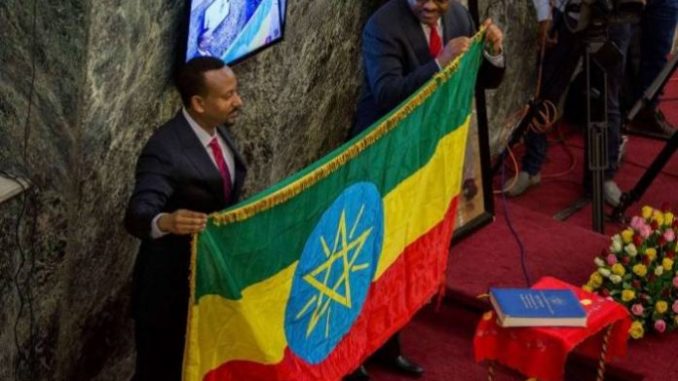
Ethiopia’s new prime minister, Abiye Ahmed, promised on Monday to push through democratic reforms in an effort to end three years of unrest that first erupted in the province of Oromiya from where he hails.
The ruling coalition picked Abiye last week to replace Hailemariam Desalegn, who quit to clear the way for reforms in Ethiopia, Africa’s second most populous nation and one of its fastest growing economies.
After taking the oath of office, the former army lieutenant general struck a conciliatory tone towards the opposition but did not mention the possibility of lifting a six-month emergency rule imposed in February after Hailemariam resigned.
“Today is a historic day. We bear witness to a peaceful transfer of power. Today our situation presents us with opportunities and threats,” Abiye told lawmakers in a 40-minute televised address.
“Democracy cannot be realized in the absence of rights, be it civil or economic rights. We all need to have a platform to voice our concerns,” he told the packed gathering, where some dissidents were also allowed to attend.
Oromiya, which surrounds the capital Addis Ababa, has been plagued by violence since 2015, largely fuelled by a sense of political and economic marginalization among its young population.
Oromos make up roughly a third of Ethiopia’s 100 million-strong population.
Need for unity
The ruling Ethiopian People’s Revolutionary Democratic Front (EPRDF) has been in power since 1991, when it took over from the Derg military regime.
The protests and unrest in Oromiya have posed the biggest ever threat to its continued rule, and have stoked ethnic tensions.
“We have a long history as one single country. But today, relations between our ethnic groups are damaged,” said Seid Yimer Ali, an ethnic-Oromo opposition politician.
“That should be his priority. He has to mend ties. He has to dismantle laws that encourage differences,” he said, referring to Ethiopia’s federal system which redrew regional boundaries along ethnic lines when implemented in 1991.
In his speech Abiye addressed the need for ethnic unity.
“Our identity is interwoven and intermingled. We are born Ethiopians and we die as Ethiopians,” he said.
Parliamentarians from Oromiya — Ethiopia’s largest region by size and population — welcomed the appointment of a leader from an ethnic group that has long complained of being sidelined.
“It is the first time in Ethiopia’s history that an Oromo has become the country’s leader. This is very significant because Oromos are the majority,” said lawmaker Abera Buno.
Human rights groups say security forces have killed hundreds of people and jailed tens of thousands in the past three years.
Opposition leaders have called for the scrapping of a decade-old anti-terror law whose vague wording they say has effectively criminalized dissent. They also want the repeal of a law that restricts the work of non-governmental organizations.
Abiye also said on Monday he wanted to resolve a two decade-old territorial dispute with neighboring Eritrea, though this did not appear to represent a shift in policy as Addis Ababa has long sought such negotiations.
At a fruit shop near the parliament, Temesghen Abera was among a group of eight men who were sipping tea, huddled around a radio that replayed his speech.
“It is too early to judge,” he said of Abiye’s appointment.
“I hope he is brave enough to bring democracy and find ways to bring our divided country together.”
